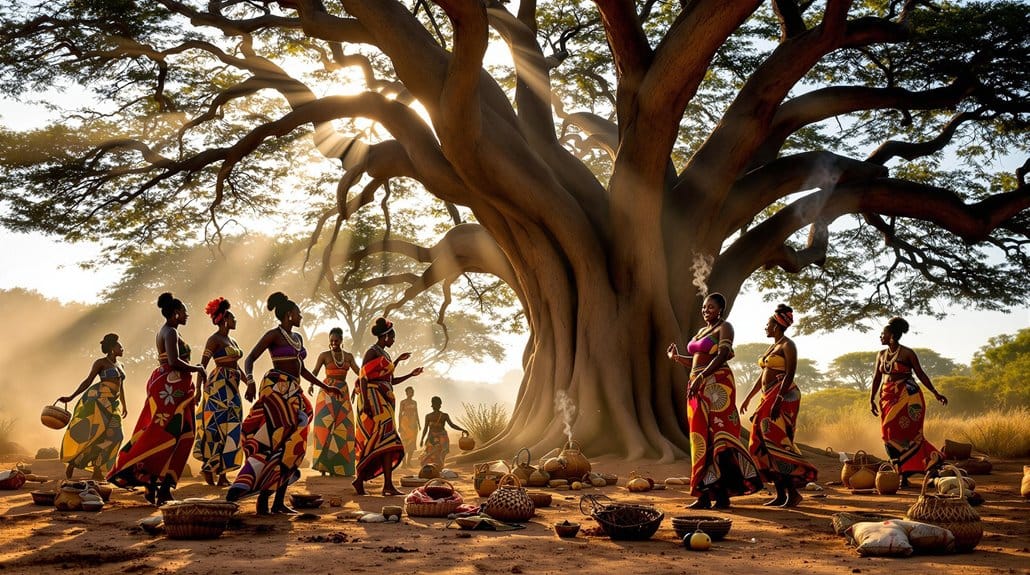To experience the richness of African spiritual heritage, you'll connect with a vibrant tapestry of ancestral worship, rituals, and beliefs that celebrate life's cycles. Engaging in rituals, like offerings to ancestors, strengthens your bond with those who came before you. You'll find wisdom in divination methods and discover the deep symbolism behind patterns and colors unique to various cultures. Amidst the modern world, traditional practices thrive alongside global faiths, showcasing adaptability and resilience. This spiritual heritage isn't just history; it's alive and evolving. The journey offers insights that reveal even more about this enchanting world just beyond the surface.
Key Takeaways
- Explore diverse traditional practices that predate colonial influences, highlighting the resilience of African spirituality through various syncretic religions.
- Participate in ancestor worship rituals, fostering connections with the past and strengthening community identity through offerings and ceremonies.
- Discover the use of divination methods, such as cowrie shell readings, which provide spiritual insights and guidance in everyday life.
- Engage with the pantheon of gods, like Orishas and Loas, to deepen your understanding of nature and the spiritual world.
- Celebrate cultural pluralism by witnessing the coexistence of indigenous rituals with global faiths, enriching the tapestry of African spiritual heritage.
Historical Significance of African Spirituality
African spirituality holds profound historical significance, reflecting a rich tapestry of beliefs that have shaped the identities of countless communities across the continent. These diverse traditions predate colonial influences, deeply rooted in the cultural significance of ethnic identities.
Despite the oppression faced during the transatlantic slave trade, where forced separations sought to erase these practices, resilience emerged. African slaves preserved core elements of their spirituality, birthing syncretic traditions like Vodou, Santeria, and Candomble, which blend African beliefs with other religious influences.
At the heart of African spirituality lies ancestral worship, a practice that fosters a connection between the living and the deceased. This veneration emphasizes the ongoing influence of ancestors, maintaining harmony and guidance within communities.
The historical context reveals how colonial powers condemned these traditional religions as primitive, prompting missionaries to suppress them. However, the enduring strength of African spirituality showcases its ability to adapt and thrive.
Today, there's a growing movement to reclaim and revitalize these beliefs and practices, celebrating their cultural significance in a global context. By embracing this heritage, you connect with a profound legacy that continues to resonate across generations.
The Role of Ancestors
At the heart of many spiritual traditions lies the profound connection to ancestors, who are revered as guiding forces in the lives of the living. In African spirituality, ancestor worship is a central tenet, emphasizing veneration and honoring the deceased as essential figures influencing your daily existence. Through rituals and offerings, you maintain this connection, ensuring the blessings of your ancestors while safeguarding against misfortune.
In African cosmology, the deceased occupy a higher existence, their impact felt in the lives of those who remember and honor them. Neglecting ancestor shrines can lead to illness or misfortune, underscoring the respect and care needed in these spiritual practices. This interconnectedness between the living and the dead fosters a strong communal identity and social cohesion.
| Ancestor | Rituals | Offerings |
|---|---|---|
| Grandparents | Prayers | Food, Drink |
| Parents | Songs | Flowers, Tokens |
| Elders | Storytelling | Incense |
| Heroes | Ceremonies | Libations |
| Guardians | Festivals | Artifacts |
Embracing this relationship enriches your spiritual journey and strengthens the bonds within your community, reminding you that you are part of a larger tapestry woven through time.
Spiritual Practices and Beliefs
Within the rich tapestry of spiritual practices and beliefs, you'll find a profound reverence for ancestral connections that shape daily life. Ancestor worship stands central, where rituals and offerings become acts of love and respect, allowing you to seek guidance from those who've passed. This ongoing relationship fosters a sense of belonging, as ancestors influence your decisions and experiences.
Divination methods, including cowrie shell readings and contemporary tarot, serve as essential tools for uncovering wisdom. These practices connect you with the spiritual domain, providing insights into life's complexities through ancestral consultation.
In the healing arts, traditional medicine intertwines with spiritual beliefs, using natural remedies and rituals to promote holistic well-being. This approach not only nurtures individual health but also reinforces community bonding, creating a support system grounded in shared values.
The pantheon of gods, featuring deities like Orishas and Loas, reflects the intricate layers of African spirituality. Each deity embodies different aspects of life and nature, enriching your understanding of the world.
Symbols such as Adinkra patterns and Vodou flags communicate spiritual messages, celebrating historical narratives and the values that unite communities.
Cultural Identity and Pluralism
Cultural identity in Africa thrives on a vibrant interplay of traditional beliefs, Christianity, and Islam, creating a unique landscape of pluralism. This rich tapestry reflects the beauty of diversity, where different religious beliefs coexist harmoniously.
In communities like the Ute in Nigeria, you'll see how cultural ties, traditional attire, and community events promote the integration of indigenous rituals alongside global faiths.
The African adage, "The sky is large enough for birds to fly around," beautifully encapsulates the essence of coexistence, inviting you to embrace varied spiritual practices without fear of exclusion.
Even today, many African Christians and Muslims actively engage in indigenous rituals, showcasing the adaptability and enduring influence of traditional beliefs in everyday life.
This dynamic interaction among faiths fosters dialogue, enriching cultural identity and mutual respect.
By participating in community events, you can witness firsthand how individuals celebrate their unique heritage while honoring the beliefs of others.
The pluralistic nature of African spirituality doesn't merely acknowledge diversity; it thrives on it, creating a sense of belonging that invites everyone to explore the depths of their cultural identity together.
Contemporary Challenges and Perspectives
The vibrant essence of indigenous African religions faces significant contemporary challenges that threaten their survival and relevance. You'll notice a decline in cultural significance as spiritual specialists, like diviners, struggle to maintain their roles as repositories of indigenous knowledge. The Ifa literary corpus from the Yoruba tradition embodies vast wisdom, yet modernization often sidelines such rich traditions.
Despite the expansion of global religions, particularly Christianity and Islam, many still engage in traditional African rituals, demonstrating the adaptability of your ancestral beliefs. This melding of practices highlights a vital point: spirituality can thrive alongside diverse faiths.
However, to truly reclaim and revitalize African traditional religions, a modern framework is essential. Academic insights emphasize the importance of fostering dialogue among diverse faiths, creating an environment of respect and understanding.
The divine feminine and ancestral worship remain cornerstones of these practices, urging you to embrace and share these identities. As you navigate contemporary challenges, consider the ways to preserve these invaluable traditions while also adapting to the ever-changing landscape.
Frequently Asked Questions
What Is the Spirituality of African Culture?
African spirituality weaves ancestral veneration and nature reverence into daily life, creating a profound sense of belonging.
You'll find community rituals that strengthen bonds and healing practices that honor both body and spirit.
Spiritual symbols and oral traditions convey mythical narratives, emphasizing interconnectedness belief.
Divination methods guide your path, while sacred spaces serve as portals to the divine.
Embracing this spiritual tapestry enriches your understanding of existence and your connection to the universe.
What Is African Religious Heritage?
African religious heritage is a vibrant tapestry woven from indigenous rituals, ancestral veneration, and deep respect for nature.
You'll find sacred spaces where community gatherings thrive, guided by spiritual leaders who embody cultural symbolism.
Oral traditions pass down wisdom, connecting generations through shared beliefs.
Healing practices often integrate natural remedies, reflecting a holistic approach to well-being.
In this rich landscape, African cosmology reveals a profound understanding of life's interconnectedness, inviting you to explore its beauty.
What Is One Common Element of Most African Spiritual Traditions?
Have you ever felt the whisper of your ancestors guiding you? One common element in most African spiritual traditions is ancestor worship.
This practice intertwines nature reverence with communal rituals, celebrating spiritual symbolism through oral traditions. Sacred spaces come alive with ritualistic dances and totemic beliefs, while healing practices and divination methods link the living with the spiritual domain, reinforcing a deep sense of belonging and interconnectedness within the community.
What Are the Principles of African Spirituality?
The principles of African spirituality revolve around ancestral veneration and a deep connection to nature.
You'll find that community rituals strengthen bonds and enhance spiritual healing.
Sacred symbols and oral traditions convey cosmological beliefs, reflecting a divine presence that guides ethical values.
Transformative practices, like divination, foster personal growth and understanding.
Engaging with these elements can help you feel a sense of belonging and connection to a rich, vibrant heritage.
Conclusion
As you explore the richness of African spiritual heritage, consider that over 70% of Africans still engage in traditional spiritual practices today. This statistic highlights the enduring relevance of these beliefs in shaping cultural identity and community cohesion. By understanding the historical significance and the role of ancestors, you not only appreciate their spiritual depth but also recognize the resilience amidst contemporary challenges. Embracing this heritage enriches your perspective on the vibrant tapestry of human spirituality.








